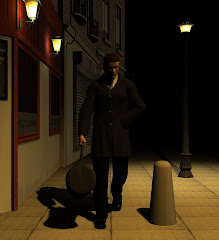
My parents had John Constable table mats when I was a child. Serious critics tend to excuse the great artists when they become consumer goods, saying it's a simple case of a glorious vision being perverted. My opinion is that the artists who get picked usually deserve it. Buy an Impressionist coaster set and you'll probably get Monet's water lilies, not Degas' vaudeville girls. Canalletto's Venetian picture postcards make good mouse mats, Caravaggio's dark melodramas don't. The people who produce these things knows that what sells in the home furnishing market is the idyllic and the bland. There are a lot of Constable table mats.
Flatford Mill has been chosen here but any number of Constable's works would have sufficed. He followed a template with minimum variety. In the foreground are generally one or two small figures. Few details can be made out on them. We learn little from even the most careful study. They are Rustics and their job is to look quaint. Constable put them to work on varying rural tasks which his aristocratic patrons liked to see doing so long as the labourer is not themselves. Here they are performing something mystifying involving boats. Elsewhere they might be fishing or driving a cart. The figures by Flatford Mill are young boys, which was a common Constable trick. Children look quaint almost by default. And they exude an innocence which seeps out over the whole painting and smothers any questions about the facts of rural life.
The figures, though, are shrivelled by their surroundings. This is a device sometimes to stunning effect. See Fragonard's Grand Cascade At Tivoli, for example, to see a demonstration of humanity's insignificance compared to nature, or Goya's Colossus for our helplessness in the face of disaster. But it doesn't quite work when the landscapes are as tedious as Constable's. What does he give us? Blue and green, green and blue. Green grass, blue sky, blue river, green leaves; the green of the trees even reflected in the blue water. There is a small brown patch in the foreground, some tiny red cottages in the distance and this is quite radical for Constable. He rarely admitted any breaks in his verdant utopias. No acknowledgement, for example, that sometimes leaves fall off trees, grasses parch and the sun occasionally sets.
And the eye searches for relief in the colour scheme because so little else is happening at Flatford Mill. Nobody is coming to intrude on the boys. No wind rustles the trees. No birds fly across the sky. All is neat and tidy, perfectly ordered by the artist. This is a flat and lifeless scene, removed from reality and stripped of any deeper meaning.
There's nothing wrong with creating from the imagination or even following a template. Lowrie, for one, basically painted the same picture his whole life and it was always several steps from sanity. But Lowrie was interesting because nobody had done anything quite like him before. Many had prior to Constable, even more have since. He either had the least fertile imagination possible or he let it be filled by others. The ruling classes, basically. His paintings are embodiments of the laziest clichés about England. The 'green and pleasant land,' that evocation of timeless plenty which is forever used to excuse all our failings. I can't look at Flatford Mill without remembering John Major quoting Orwell's grisly lines about spinsters cycling to village churches. Or The Day Today's spoof propaganda film: a jolly policeman smoking a bifta while a voice drones "This is England. And it's all right. Everything's all right…"
Everything isn't, of course. It certainly wasn't in 1817 when Flatford Mill was painting. A godless alliance of capitalists and aristocrats were stripping the last few rights from the rural poor. The happy, faceless peasants which Constable painted were being thrown off the land and into the workshops and proto-factories which comprised the first, worst stage of the Industrial Revolution. His scenes were outdated even when he painted them. But at best he ignored these changes, at worst he ignored the agents implementing them. As a result he gave us unnatural nature scenes and social commentaries with no social worth whatsoever. On to the dinner table with them all, where at least they can perform one useful function.
